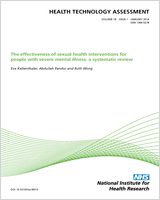Enhanced psychological care in cardiac rehabilitation services for patients with new-onset depression: the CADENCE feasibility study and pilot RCT
Health Technology Assessment, No. 22.30
Authors
Suzanne H Richards,1 John L Campbell,1,* Christopher Dickens,2 Rob Anderson,2 Manish Gandhi,3 Andy Gibson,4 David Kessler,5 Luke Knight,3 Willem Kuyken,6 David A Richards,2 Rod S Taylor,1,2 Katrina Turner,5 Obioha C Ukoumunne,7 Antoinette Davey,1 Fiona C Warren,1 Rachel E Winder,1 and Christine A Wright1.Affiliations
Headline
Organisational and workload constraints were significant barriers to implementation, although the intervention was valued by both patients and nurses and a pilot cluster trial was successfully run.
Abstract
Background:
Around 19% of people screened by UK cardiac rehabilitation programmes report having moderate or severe symptoms of depression. These individuals are at an increased risk of cardiac mortality and morbidity, reduced quality of life and increased use of health resources compared with their non-depressed counterparts. Maximising psychological health is a goal of cardiac rehabilitation, but psychological care is patchy.
Objective(s):
To examine the feasibility and acceptability of embedding enhanced psychological care (EPC) within cardiac rehabilitation, we tested the feasibility of developing/implementing EPC and documented the key uncertainties associated with undertaking a definitive evaluation.
Design:
A two-stage multimethods study; a feasibility study and a qualitative evaluation, followed by an external pilot cluster randomised controlled trial (RCT) with a nested qualitative study.
Setting:
UK comprehensive cardiac rehabilitation teams.
Participants:
Adults eligible for cardiac rehabilitation following an acute coronary syndrome with new-onset depressive symptoms on initial nurse assessment. Patients who had received treatment for depression in the preceding 6 months were excluded.
Interventions:
The EPC intervention comprised nurse-led mental health-care co-ordination and behavioural activation within cardiac rehabilitation. The comparator was usual cardiac rehabilitation care.
Main outcome measures:
Measures at baseline, and at the 5- (feasibility and pilot) and 8-month follow-ups (pilot only). Process measures related to cardiac team and patient recruitment, and participant retention. Outcomes included depressive symptoms, cardiac mortality and morbidity, anxiety, health-related quality of life and service resource use. Interviews explored participant and nurses’ views and experiences.
Results:
Between September 2014 and May 2015, five nurses from four teams recruited participants into the feasibility study. Of the 203 patients screened, 30 were eligible and nine took part (the target was 20 participants). At interview, participants and nurses gave valuable insights into the EPC intervention design and delivery. Although acceptable, the EPC delivery was challenging for nurses (e.g. the ability to allocate sufficient time within existing workloads) and the intervention was modified accordingly. Between December 2014 and February 2015, 8 out of 20 teams approached agreed to participate in the pilot RCT [five were randomised to the EPC arm and three were randomised to the usual-care (UC) arm]. Of the 614 patients screened, 55 were eligible and 29 took part (the target was 43 participants). At baseline, the trial arms were well matched for sex and ethnicity, although the EPC arm participants were younger, from more deprived areas and had higher depression scores than the UC participants. A total of 27 out of 29 participants were followed up at 5 months. Interviews with 18 participants (12 in the EPC arm and six in the UC arm) and seven nurses who delivered EPC identified that both groups acknowledged the importance of receiving psychological support embedded within routine cardiac rehabilitation. For those experiencing/delivering EPC, the intervention was broadly acceptable, albeit challenging to deliver within existing care.
Limitations:
Both the feasibility and the pilot studies encountered significant challenges in recruiting patients, which limited the power of the pilot study analyses.
Conclusions:
Cardiac rehabilitation nurses can be trained to deliver EPC. Although valued by both patients and nurses, organisational and workload constraints were significant barriers to implementation in participating teams, suggesting that future research may require a modified approach to intervention delivery within current service arrangements. We obtained important data informing definitive research regarding participant recruitment and retention, and optimal methods of data collection.
Future research:
Consideration should be given to the delivery of EPC by dedicated mental health practitioners, working closely with cardiac rehabilitation services.
Trial registration:
Current Controlled Trials ISRCTN34701576.
Funding:
This project was funded by the National Institute for Health Research (NIHR) Health Technology Assessment programme and will be published in full in Health Technology Assessment; Vol. 22, No. 30. See the NIHR Journals Library website for further project information.
About the Series
Article history
The research reported in this issue of the journal was funded by the HTA programme as project number 12/189/06. The contractual start date was in April 2014. The draft report began editorial review in October 2016 and was accepted for publication in September 2017. The authors have been wholly responsible for all data collection, analysis and interpretation, and for writing up their work. The HTA editors and publisher have tried to ensure the accuracy of the authors’ report and would like to thank the reviewers for their constructive comments on the draft document. However, they do not accept liability for damages or losses arising from material published in this report.
Declared competing interests of authors
Rob Anderson contributes to the work of the National Institute for Health Research (NIHR) Health Services and Delivery Research (HSDR) programme as an unpaid member of their funding advisory panel (a researcher-led funding stream). Rod S Taylor is the chairperson of the NIHR HSDR researcher-led panel, a member of the Health Technology Assessment (HTA) Efficient Study Designs Board, the NIHR Priority Research Advisory Methodology Group, the HTA General Board, the HTA Themed Call, the Core Group of Methodological Experts for the NIHR Programme Grants for Applied Research programme and the HSDR Commissioning Board (commissioned and researcher led). Willem Kuyken receives royalties from the publication of Kuyken W, Padesky CA, Dudley R, Collaborative Case Conceptualization, New York, NY: Guildford Press; 2011, outside the submitted work.
Disclaimer
This report contains transcripts of interviews conducted in the course of the research and contains language that may offend some readers.
Last reviewed: October 2016; Accepted: September 2017.
